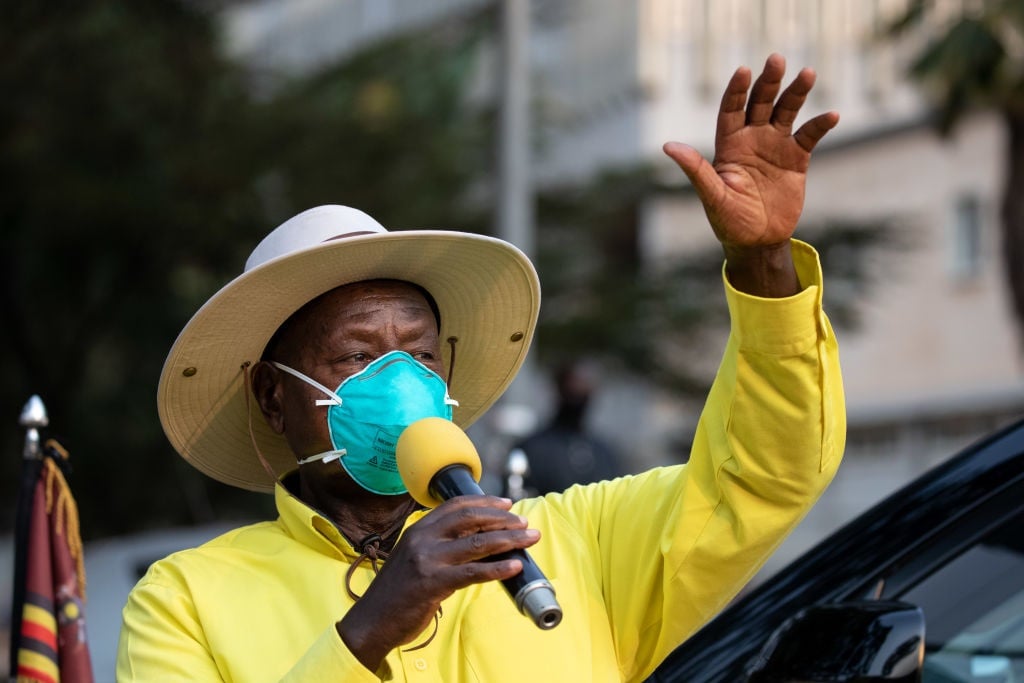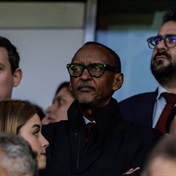
- Since independence in 1962, Uganda has had nine presidents - with Yoweri Museveni ruling for 36 years.
- Museveni invited regional leaders for Independence Day celebrations.
- He vowed to go ahead with the oil pipeline through Tanzania to the Indian Ocean, despite EU concerns.
Amid a shocking Sudan Ebola outbreak, with no vaccine, and heavily-contested human rights, Uganda turns 60 on Sunday.
Buganda Kingdom, as the country was known before colonisation by the British East Africa Company in 1894, gained independence on 9 October 1962.
Its founding father, the Kabaka King of Buganda, Sir Edward Mutesa II, is not known to many in Africa.
The year after independence, Uganda adopted a constitution that abolished links with the British monarch.
In 1966, King Kabaka fell out with Milton Obote, who at the time served as prime minister.
Obote removed the king via a coup and led from 1966 to 1971, but was eventually dislodged by the eccentric Idi Amin in 1971, via another coup.
Historians, such as Harriet Aldrich and others, noted that Amin found out that Obote wanted to arrest him on allegations that he had abused army funds.
For his survival, he had to go for the number one spot and remove Obote from office, when he was away in Singapore attending a Commonwealth Summit.
From 1971 to 1979, Uganda was ruled by one of Africa's prototype dictators, Amin.
When Amin came onto the scene as the new military leader, he appealed to the emotions of Ugandans.
For one, he held a state funeral in April 1971 for King Mutesa, who died exiled in the UK.
But Amin would later be known for his hilarious, but serious and far-reaching diabolic manoeuvres, such as persecuting ethnic groups and political rivals, while Obote fled to Tanzania.
READ | Uganda Ebola outbreak death toll up to 29, says WHO
With his cheeky attitude towards the West, particularly the UK, Amin gained notoriety when he led anti-Asian sentiments in Uganda, eventually expelling about 40 000-60 000 of them.
But his reign ended on 11 April 1979 when Tanzanian troops and forces of the Uganda National Liberation Front closed in.
Within two days, Amin fled the country.
Between mid-1979-1980, Uganda had three presidents: Godfrey Binaisa, a little over a year, Paulo Muwanga, served for eight days, and then Yusuf Lule had two months in power.
The 1980 elections were won by Obote's Uganda People's Congress (UPC) party as he made a comeback.
For the next six years, Yoweri Museveni, and a disgruntled Lule, launched a guerrilla offensive and finally wrestled power in 1986, through the National Resistance Army (NRA).
Obote died of kidney failure in a hospital in Johannesburg, South Africa, aged 79, on 10 October 2005, a day after the country celebrated 43 years of independence.
Museveni, the strongman
Museveni, 76, is a political science and economics graduate from the University of Dar es Salaam.
He has ruled for 36 years, while his eight predecessors have shared 24 years.
His rule has been nothing short of autocracy.
Last year, he was re-elected as president in what Human Rights Watch (HRW) flagged as, "marred by widespread violence and repression. Security forces arbitrarily arrested and beat opposition supporters and journalists, killed protesters, and disrupted opposition rallies".
READ | Oil giants' East Africa mega-project risks causing 'unacceptable' damage - report
There has yet to be any commitment to end the violations of freedom of association, assembly and expression, which persist in Uganda.
On the eve of independence day, leading opposition leader Bobi Wine was detained in Dubai, where a charity concert had been planned.
He blames this on Museveni.
But while Wine's party was thwarted, Museveni's must go on.
For independence day celebrations, Museveni invited to Kampala, Kenyan president William Ruto, Everiste Ndayishimiye of Burundi, Salva Kiir of South Sudan, Hassan Sheikh Mohamud of Somalia, Hussein Mwinyi of Zanzibar, with whom he discussed issues of mutual interest in the region.
To the masses, Museveni preached patriotism, Pan-Africanism and social economic transformation.
"As we make 60 years of independence, let everybody embrace wealth creation and the principles and strategies that support it, patriotism, Pan-Africanism and social economic transformation, and avoid idleness, dependency and parasitism," he said in his independence day speech.
Economy
Uganda's economy, according to the International Monetary Fund (IMF), grew by 4.6% against a projected 4.9%. That's a strong showing, coming back from the Covid-19 pandemic.
Museveni's economic magic bullet is the planned East African Crude Oil Pipeline (Eacop) project.
The Eacop is what will eventually transport Uganda's waxy crude oil from the oil fields in mid-western Uganda to Tanzania's Indian Ocean Tanga port en route to the international market.
Approximately 1.4 billion of Uganda's 6.5 billion barrels of proven oil reserves, located mostly on its western border with the Democratic Republic of Congo, are estimated to be economically viable.
What stands in the way is the European Union (EU), which raised concerns about human rights and environmental damage.
However, in China, Museveni has found an ally.
China's ambassador to Uganda, Zhang Lizhong, told journalists the EU "should not use the excuse of environmental and human rights issues to block development".
The News24 Africa Desk is supported by the Hanns Seidel Foundation. The stories produced through the Africa Desk and the opinions and statements that may be contained herein do not reflect those of the Hanns Seidel Foundation.




 Publications
Publications
 Partners
Partners
























